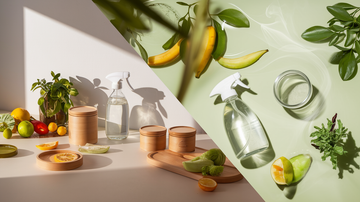- Introduction: The Truth About Zero-Waste Living
- Myth #1: Zero-Waste Living Is All-or-Nothing
- Myth #2: Sustainable Products Don't Clean Effectively
- Myth #3: Living Sustainably Is Extremely Expensive
- Myth #4: Zero-Waste Living Takes Too Much Time
- Myth #5: Individual Actions Don't Make a Difference
- Myth #6: Natural Products Aren't Safe or Effective
- Practical Steps to Start Your Zero-Waste Journey
- Conclusion: Embracing Sustainable Living, One Step at a Time
Every day, the average Singaporean generates about 0.8kg of solid waste. Multiply that by our population, and we're looking at a staggering amount of waste heading to Semakau Landfill, which is projected to reach capacity by 2035. As environmental consciousness grows, more people are considering zero-waste living—yet many hesitate, held back by persistent myths and misconceptions.
At Green Kulture, we understand these concerns. The journey toward sustainability can seem overwhelming when clouded by misinformation. That's why we're addressing the most common zero-waste living myths, separating facts from fiction to empower your eco-friendly choices.
Whether you're just beginning to explore sustainable options or looking to deepen your commitment to environmental responsibility, this guide will help clarify misconceptions and provide practical insights. Let's uncover the truth about zero-waste living and discover how accessible, affordable, and impactful it can truly be.
Myth #1: Zero-Waste Living Is All-or-Nothing
The Fiction: You must eliminate all waste immediately and live a picture-perfect, Instagram-worthy zero-waste lifestyle or you're not doing it right.
The Fact: Sustainable living exists on a spectrum, and every positive change makes a difference. The term "zero-waste" represents an aspirational goal rather than an immediate expectation. In reality, even the most dedicated environmental advocates don't produce literally zero waste.
The truth is that sustainability is a journey, not a destination. Starting with small, manageable changes creates lasting habits that gradually reduce your environmental footprint. Whether you're switching to natural cleaners with enzymatic solutions or beginning to refuse single-use plastics, each step matters.
Remember Anne-Marie Bonneau's wisdom: "We don't need a handful of people doing zero waste perfectly. We need millions of people doing it imperfectly." This perspective relieves the pressure of perfection and encourages broader participation in environmental stewardship.
Myth #2: Sustainable Products Don't Clean Effectively
The Fiction: Natural cleaning products are ineffective compared to harsh chemical cleaners.
The Fact: Modern sustainable cleaning products powered by multi-enzyme technology offer exceptional cleaning performance without toxic chemicals.
Enzymatic cleaners work differently than traditional chemical cleaners but are equally—if not more—effective. Rather than using harsh chemicals that can leave toxic residues, enzymatic solutions use natural biological processes to break down dirt, grime, and organic matter.
At Green Kulture, our natural cleaners harness the power of fruit and vegetable enzymes that effectively function as cleaning agents while ensuring child-safe, non-toxic results. These enzymatic solutions target specific types of soils and stains:
For example, proteins in food stains are broken down by protease enzymes, while lipase enzymes tackle greasy residues. This targeted approach offers superior cleaning performance without the health and environmental risks associated with conventional chemical cleaners.
The cleaning effectiveness of enzymatic solutions isn't just marketing—it's backed by science. These plant-derived formulations create a healthier home environment by eliminating harmful chemicals that can affect indoor air quality and potentially harm family members and pets.
Myth #3: Living Sustainably Is Extremely Expensive
The Fiction: Adopting a zero-waste lifestyle requires expensive specialty products and premium organic everything.
The Fact: While some sustainable products may have higher upfront costs, they often save money in the long run through durability, refillability, and reduction of wasteful consumption.
Sustainable living can actually be economical in several ways:
- Refill systems save money: Products like our refillable cleaners cost less per use than repeatedly buying new containers.
- Buying less saves more: Zero-waste living emphasizes quality over quantity and needs over wants.
- Bulk purchasing reduces costs: Our Bundle & Save options allow you to stock up on essentials at reduced prices.
- DIY options cut expenses: Simple homemade solutions using basic ingredients can replace multiple specialty products.
At Green Kulture, we believe sustainable products should be accessible to everyone. That's why we strive to make our natural, enzymatic cleaning solutions affordable without compromising quality or environmental responsibility.
Myth #4: Zero-Waste Living Takes Too Much Time
The Fiction: Sustainable living requires endless hours of meal prep, DIY projects, and complicated routines.
The Fact: While some sustainable practices may require initial time investments as you adjust, many actually simplify your life and save time in the long run.
Modern ecological solutions are designed with convenience in mind. For busy individuals and families, products like Green Kulture's enzymatic cleaners offer the dual benefit of effectiveness and efficiency—no need to switch between multiple cleaning products for different surfaces.
Simple swaps like reusable shopping bags, water bottles, and food containers quickly become second nature, requiring almost no additional time. Streamlining possessions and focusing on multipurpose items actually reduces the time spent managing, cleaning, and replacing things.
Many sustainable practices can be incorporated gradually without disrupting your existing routine. Start with the changes that fit most naturally into your lifestyle, then build from there as your comfort level increases.
Myth #5: Individual Actions Don't Make a Difference
The Fiction: Personal sustainability efforts are insignificant compared to corporate and industrial pollution.
The Fact: While systemic change is essential, individual actions create meaningful impact through both direct environmental benefits and wider social influence.
Every sustainable choice creates ripples of positive change:
When you choose enzymatic cleaning solutions over chemical products, you prevent toxic substances from entering waterways. When multiple households make this same choice, the collective impact becomes substantial. A Singapore household switching to natural cleaners can prevent hundreds of plastic bottles and liters of chemicals from entering the waste stream annually.
Beyond the direct environmental impact, your choices influence others. Friends, family, and colleagues notice sustainable habits and often become curious about adopting similar practices. This social diffusion of behavior creates a multiplier effect that can spread throughout communities.
Additionally, consumer demand drives market change. When more people choose sustainable products, companies respond by developing more eco-friendly options. Your purchasing decisions send powerful signals to businesses about what consumers value.
Myth #6: Natural Products Aren't Safe or Effective
The Fiction: Natural and enzymatic products lack sanitizing power and safety standards.
The Fact: High-quality natural products with enzymatic solutions can safely and effectively clean and sanitize without harsh chemicals.
This myth stems from misconceptions about how natural cleaning works. Traditional cleaners rely on strong chemicals that can irritate skin, respiratory systems, and damage surfaces over time. In contrast, enzymatic cleaners use natural biological processes to break down soil, stains, and organic matter.
Green Kulture's enzymatic solutions are derived from fruit and vegetable enzymes that effectively function as cleaning agents while ensuring child-safe, non-toxic results. This natural approach doesn't compromise on effectiveness—it simply works differently and more safely than conventional chemical cleaners.
The absence of harsh chemicals doesn't mean compromised cleaning power. In fact, enzymatic cleaners can be more effective at targeting specific types of dirt and stains. They continue working even after application, breaking down organic materials at the molecular level.
For families with children, pets, or individuals with sensitivities, these natural solutions provide peace of mind along with cleanliness. They eliminate concerns about toxic residues on surfaces that family members might touch or ingest.
Practical Steps to Start Your Zero-Waste Journey
Now that we've debunked common myths, here are some practical, achievable steps to begin or advance your sustainable living journey:
1. Assess Your Current Impact
Before making changes, understand your starting point. Observe your waste production for a week, noting patterns and identifying areas with the most potential for improvement. This awareness creates a baseline for measuring progress.
2. Adopt the 5Rs Hierarchy
Follow this prioritized approach to waste reduction:
- Refuse what you don't need
- Reduce what you do consume
- Reuse items instead of disposable alternatives
- Recycle what can't be refused, reduced, or reused
- Rot (compost) organic waste
3. Switch to Natural Cleaning Solutions
Replace conventional cleaning products with enzymatic alternatives. Green Kulture's natural cleaners use multi-enzyme technology derived from fruit and vegetable enzymes, effectively cleaning your home without introducing harmful chemicals into your living space or the environment.
4. Embrace Refill Systems
Reduce packaging waste by utilizing refill options. Our Get Refills collection allows you to reuse containers, significantly cutting down on plastic waste while saving money.
5. Start in One Area
Rather than overwhelming yourself with a complete lifestyle overhaul, begin with one area of your home. The kitchen or bathroom often offers numerous opportunities for sustainable swaps. Once these changes become habits, expand to other areas.
6. Build Community
Connect with others on similar journeys, whether through local groups, online communities, or friends interested in sustainability. Sharing experiences, challenges, and successes creates accountability and inspiration.
7. Practice Patience and Self-Compassion
Remember that perfection isn't the goal. Celebrate small wins, learn from setbacks, and continue moving forward. Sustainable living is a lifelong journey of continuous improvement rather than an overnight transformation.
Conclusion: Embracing Sustainable Living, One Step at a Time
As we've explored throughout this article, many of the common myths surrounding zero-waste living don't stand up to scrutiny. Sustainable living doesn't require perfection, expensive investments, or extraordinary time commitments. Instead, it's about making mindful choices that align with your values and gradually build upon each other.
At Green Kulture, we believe in making sustainability accessible and practical for everyone. Our enzymatic solutions offer a simple yet powerful way to reduce environmental impact while creating a healthier home environment. By choosing natural, plant-derived cleaners, you're taking a significant step toward reducing toxic chemical exposure and plastic waste.
Remember that sustainability is a journey rather than a destination. Each positive choice contributes to collective impact, regardless of where you are on your eco-friendly path. Whether you're just beginning to explore zero-waste options or looking to deepen your commitment, your efforts matter.
We invite you to explore our range of natural, enzymatic cleaning solutions as part of your sustainable living journey. Together, we can work toward building a healthier environment for ourselves, our loved ones, and our Earth—one mindful choice at a time.
Ready to take the next step in your sustainable journey?
Discover our range of natural, enzymatic cleaning solutions designed to make eco-friendly living simple, effective, and affordable.
Check out our current Promotions and Bundle & Save options to make sustainable living even more accessible.





